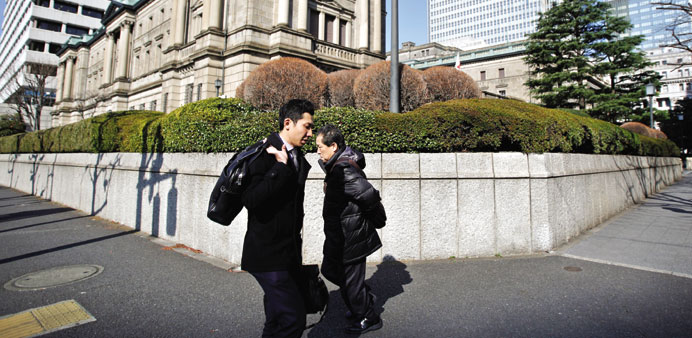Pedestrians walk past the Bank of Japan headquarters in Tokyo. Japan’s ¥3.2tn sale of six-month treasury discount bills on March 5 drew an average yield of 0.0337%, the lowest on record dating back to 2007.
Bloomberg/Singapore
The Bank of Japan’s (BoJ) failure to spur demand for its cheap loans is forcing it to buy more treasury bills rather than make more-productive asset purchases.
The BoJ raised holdings of bills maturing in one year or less by 7.21tn yen ($70bn) this year as of February 28, exceeding the 6.09tn yen increase for the eight months through Decemebr 31 after the central bank expanded stimulus in April. In contrast, the outstanding balance of its loan programmes fell 10% between April and February. Three-month bill rates have almost halved in the past six months to 0.05%, while those in the US have risen four basis points.
Governor Haruhiko Kuroda has succeeded in increasing the supply of money by buying bills and bonds, weakening the yen and putting Japan on the path toward its 2% inflation target. He has been less successful in encouraging banks to boost lending and finding takers for 0.1% favorable loans, reflecting the limitations of monetary policy as a means to spur economic growth. “I can’t rule out the possibility that bill yields will briefly break below zero,” said Toshiaki Terada, a researcher at Totan Research Co, a money-market brokerage in Tokyo. “There’s little benefit for financial companies in borrowing at 0.1% because there aren’t any worthy assets available that offer higher returns.”
A negative rate means investors who hold the debt until expiry will receive less than they paid to buy. US three-month bill yields fell to negative 0.0101% on September 27 amid political gridlock over the budget. Germany sold two-year notes in July 2012 with a yield below zero for the first time ever as a sovereign-debt crisis prompted investors to seek safety.
Japan’s 3.2tn yen sale of six-month treasury discount bills on March 5 drew an average yield of 0.0337%, the lowest on record dating back to 2007. The offering of three-month securities the next day saw the yield fall to 0.0328%, the second least in data starting July 2012. The BoJ bought 2tn yen of bills on February 28 with yields 0.2 basis point lower on average than market rates. Three-month securities yielded 0.036% that day, data compiled by the Japan Securities Dealers Association showed. The “tight” supply-demand balance for T-bills will keep their yields anchored, prompting investors to buy longer- maturity government bonds for higher returns, according to Tomohiro Miyasaka, the Tokyo-based director for fixed-income strategy at Credit Suisse Group AG, one of the 23 primary dealers obliged to bid at government debt auctions.
The extra yield that investors can get by holding two-year sovereign notes instead of three-month bills has shrunk to two basis points. The comparable spread is 29 basis points in the US and nine basis points in Germany.
The benchmark 10-year note yield was 0.625% in Tokyo on March 7, the least globally. It fell to as low as 0.57% on March 3, a level unseen since May 7. While yields will remain at the current levels for the rest of this year, bill rates are unlikely to fall below zero, Credit Suisse’s Miyasaka said.
“If interest on bank deposits for savers becomes negative, money-market funds would not be able to secure the principal,” he said. “Considering such a broad impact, it’s technically very difficult” for bill rates to be negative.
In addition to purchasing bills and offering 0.1% loans to banks, the BoJ buys about 7tn yen of government debt every month to spur lending and investments in riskier assets through lower borrowing costs. Demand for bank lending is still muted as businesses are awash with cash. The outstanding balance of domestic bank loans was at 413tn yen in January, 23% lower than a record high in 1996, though it increased 2.5% from a year earlier. Non- financial private companies in Japan held a record 224tn yen in cash at the end of September, the latest central bank data show, which is bigger than Russia’s gross domestic product in dollar terms.
Thirty-eight% of 34 economists forecast the BoJ will add to its unprecedented stimulus by the end of June, according to a Bloomberg News survey conducted February 6-12. The government is set to start a two-step sales-tax increase in April, which economists say will send the world’s third-largest economy into the deepest contraction in the second quarter since March 2011.
Growth will resume in the following three-month period with economic expansion reaching 1.5% in 2014, the analysts forecast. That compares with 1.55% last year, when the yen’s 18% plunge versus the dollar helped drive a 51% jump in the Topix index of shares. The currency traded at 102.89 as of 6:01 p.m. in Tokyo on March 7.

